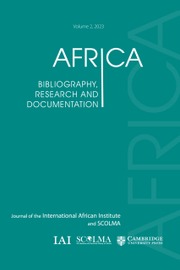No CrossRef data available.
Article contents
A tool for reassessment: using the archives of Frederick Lugard at Oxford and online
Published online by Cambridge University Press: 28 March 2025
Abstract
The extensive archives of Frederick Lugard are an underused resource for reassessing Lugard himself, reconsidering his impact on specific places and issues, and uncovering African perspectives, refracted as they inevitably are by the perspective of an explorer, military officer, colonial governor, and elder statesman. Literature searches reveal that scholars seldom consult the Lugard papers. They will be of particular interest for scholars from Africa studying the effects on pre-colonial African states of British interference, the onset of foreign rule, and the efforts of African individuals, communities, and elites to resist or co-opt imperial power.
Resumé
Les vastes archives de Frederick Lugard constituent une ressource sous-utilisée pour réévaluer Lugard lui-même, reconsidérer son impact sur des lieux et des problèmes spécifiques et découvrir les perspectives africaines, réfractées comme elles le sont inévitablement par le point de vue d’un explorateur, d’un officier militaire, d’un gouverneur colonial et d’un homme d’État âgé. Les revues de littérature publiée révèlent que les chercheurs consultent rarement les articles de Lugard. Ils présenteront un intérêt particulier pour les chercheurs africains qui étudient les effets de l’ingérence britannique sur les États africains précoloniaux, l’apparition de la domination étrangère et les efforts des individus, des communautés et des élites africaines pour résister ou coopter le pouvoir impérial.
Information
- Type
- Working with archives
- Information
- Copyright
- © The Author(s), 2025. Published by Cambridge University Press on behalf of the International African Institute

